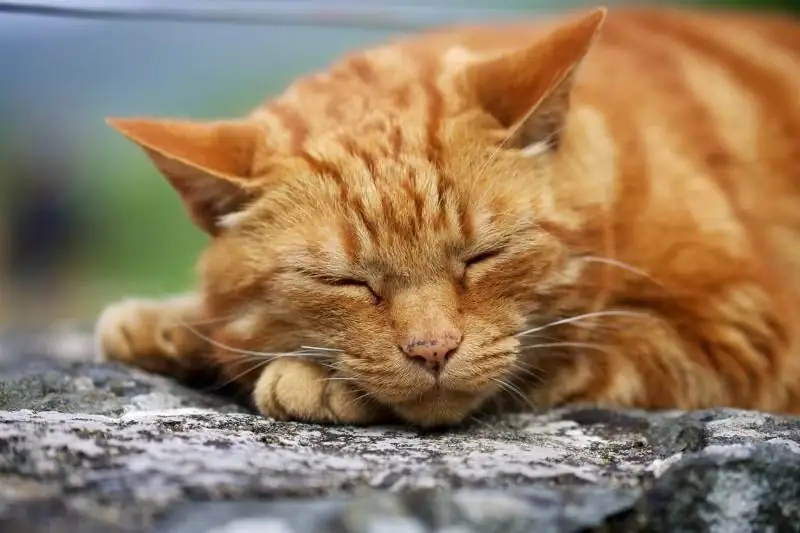
Table of contents:
- Author Bailey Albertson albertson@usefultipsdiy.com.
- Public 2023-12-17 12:53.
- Last modified 2025-06-01 07:32.
Causes of cough in cats

When the owner notices a cat's cough, there is always a temptation to treat the animal in the same way as a person heals himself - with the use of antitussives. A competent owner who knows about the causes of cough in cats will always do otherwise, given that coughing is a symptom.
Content
-
1 Types of cough in cats
- 1.1 Cough with a foreign body in the pharynx
- 1.2 Cough when inhaling irritants
-
1.3 Cough in diseases
- 1.3.1 Respiratory viral infections
- 1.3.2 Asthma
- 1.3.3 Pneumonia
- 1.3.4 Helminthiasis
- 1.3.5 Heart disease
- 1.3.6 Chest injury
- 2 In what cases you need to urgently see a doctor
-
3 Drug therapy for cough in cats
- 3.1 Table: Overview of Medicines Used to Treat Cough in Cats
- 3.2 Herbal decoctions for the treatment of cough in a cat
- 4 Is a cat's cough dangerous for humans
- 5 Prevention of cough in cats
Types of cough in cats
Coughing in cats is always a symptom of a disease or condition, is uncommon, and looks like an alarming indicator of a cat's health problems. Savvy cats skillfully avoid situations that provoke the appearance of a cough - they show less physical and emotional activity, they try to stay in places with good ventilation, so a cough will not always be the initial symptom for them when a disease occurs.
The cough is of a reflex nature and appears when the respiratory tract receptors are irritated; it helps to cleanse the mucous membrane from various irritants of a mechanical, chemical and microbial nature. The cough usually manifests itself quite characteristically: by contracting the diaphragm and respiratory muscles, the cat pulls in its abdomen and arch its back, its neck is usually stretched down; she makes abrupt coughing and wheezing sounds.
It is necessary to pay attention to the nature of the cough, the circumstances that cause it, as well as other symptoms that make it possible to determine the disease.

When coughing, the cat takes a typical posture
According to the main parameters, cough can be divided into:
- dry and wet: moist is a cough accompanied by sputum; with dry cough, there is no sputum, it is sharper;
- by sound: sound can be muffled or voiced;
- by duration: the first-onset cough is considered acute, the duration of which does not exceed a week. A chronic cough can be present for months;
-
due to the time of day or year:
- morning, afternoon, evening and night cough;
- spring, summer, winter, autumn;
- by the strength of manifestation: the cough can be weak and manifest itself as a slight cough, as well as strong - in this case, it will resemble the urge to vomit;
- by the regularity of its appearance - it can be permanent or appear periodically;
- due to the influence of external factors: provoked or unprovoked.
Cough with a foreign body in the throat
A foreign body in the upper respiratory tract in cats is rare and manifests itself as a sudden attack of severe coughing, suffocation, cyanosis of the mucous membranes, which is never observed, for example, when a cat tries to regurgitate a hairball from the stomach. The pet should be taken to the veterinary clinic as soon as possible to remove the foreign body.
Coughing up irritants
Inhalation of smells of household chemicals, perfumes, cigarette smoke can provoke a cat's coughing attack, which is usually accompanied by sneezing. Coughs and sneezes are caused directly by the irritating odor.

The first thing to be sure of when a cat has a sudden cough is the absence of a foreign body in the airways, which is manifested by difficulty breathing, cyanosis of the mucous membranes.
Cough with diseases
Cough is a valuable diagnostic feature of a variety of diseases.
Respiratory viral infections
A cough appears with infectious diseases that affect the respiratory system. Together with a cough, it is usually observed:
- fever;
- general oppression;
- lack of appetite;
-
depending on the type of pathogen, it may be:
- conjunctivitis;
- diarrhea;
- elements of a rash on the skin or lesions of the mucous membranes.
The nature of the cough changes during the course of the disease: from dry it becomes wet.
Asthma
Asthma is a chronic inflammatory disease of the airways in which the cells of the immune system are actively involved. Asthma is caused by allergies, very often - to pollen, household chemicals, but, theoretically, it can be any substance. Asthma is characterized by attacks of spastic contraction of the bronchi, which is manifested by convulsive cough, shortness of breath; the cat breathes with an open mouth. The cough is manifested by attacks, there is no cough in between. Also, there is no fever and other manifestations characteristic of the development of an infectious disease. Asthma is characterized by seasonality - spring-autumn time, as well as a tendency to nocturnal coughing fits, this is due to the weakening of the natural sympathetic innervation at night, which prevents the narrowing of the bronchi.

In asthma, cough is paroxysmal and is often associated with exposure to an allergen, such as pollen
Pneumonia
Pneumonia usually occurs as a complication of a current infectious disease and is characterized by a worsening of the condition in the form of increased fever, progression of general depression, and severe cough with sputum. Sometimes pneumonia is caused by nonspecific flora, for example, when a cat is severely hypothermic, if she has heart failure or immunodeficiency conditions.
Helminthiasis
In some helminthiasis, a cough occurs when the larvae of the worms migrate and are carried into the bronchi and lungs with the blood stream. Cough with helminthiasis is of a short and moderate nature, it can end in vomiting. In some cases, with massive infection with helminths, they penetrate the stomach and esophagus, which also causes a cough.
Heart diseases
With heart disease, its size gradually increases; the enlarged heart presses on the trachea, causing a cough. A cough in heart disease sounds dull and is not accompanied by sputum; develops gradually and increases with physical exertion. In parallel, you can find other symptoms of heart disease:
- weight loss;
- pallor or cyanosis of the mucous membranes and unpigmented nose;
- growing weakness and lethargy of the cat;
- heart rhythm disturbances;
- with the development of ascites, the size of the abdomen increases;
- fainting.
Chest injury
In case of chest injuries, urgent surgical conditions can occur, accompanied by a cough:
- pneumothorax - the accumulation of air in the pleural cavity as a result of injury to the lung tissue by a broken rib;
- hemothorax - accumulation of blood in the pleural cavity with trauma to a blood vessel;
- chylothorax - if, as a result of a chest injury, the thoracic lymphatic duct ruptures, lymph accumulates in the pleural cavity;
- diaphragmatic hernia - in severe injuries, the diaphragm ruptures and the abdominal organs exit into the chest; at the same time, shortness of breath and cough develops.
These are severe life-threatening conditions in which shortness of breath, cardiac dysfunction, shock is observed. A cat's life depends on how quickly it gets to the vet. In the veterinary clinic, a set of anti-shock measures and drainage of the damaged pleural cavity with the removal of air or accumulated fluids are carried out, which contributes to the expansion of the lung and the restoration of its function.
When do you need to urgently see a doctor?
A doctor should be consulted in all cases of a cat's cough, especially if the cause is unknown. Cough is a symptom of a large number of diseases, and in order to cure it, it is important to correctly identify the cause of the disease. The appearance of a cough can signal the onset of an infectious disease, as well as a decompensation of the course of a chronic disease; therefore a visit to the vet is necessary. When visiting a veterinarian, it is important to correctly describe the nature of the cat's cough; you should not give antitussives to the animal on your own, as this will make it difficult to make a correct diagnosis.

When a cough occurs, a visit to the veterinarian is mandatory - since there are a lot of diseases that accompany cough
Drug therapy for cough in cats
For symptomatic therapy of the actual cough used:
- antitussives of central action - block the area of the brain responsible for the onset of cough, thereby breaking the arc of the cough reflex. These funds are rarely prescribed, with an intense dry cough exhausting the animal. They are potent, and it must also be borne in mind that the cough has a protective function, accelerating the evacuation of the pathogen, toxins and inflammation products from the respiratory tract, therefore, the cat needs it to accelerate recovery. Not prescribed for wet cough;
- mucolytic (expectorant) agents - liquefy phlegm, increasing its amount by increasing the fluid content; the cough becomes productive, which helps to clear the airways as soon as possible. Mucolytics should be handled with caution and the dosage prescribed by the doctor should be strictly observed, and their combination should be avoided in the therapy regimen, as this may result in a slowdown in the evacuation of an increased amount of sputum and the development of pneumonia.
Table: Overview of Medicines Used to Treat Cough in Cats
| A drug | Structure | Operating principle | Price, rub |
| Bromhexine | Bromhexine | Increases the amount of phlegm, facilitates its excretion, slightly reduces the intensity of cough | from 20 |
| Codeine phosphate | Codeine phosphate | Refers to narcotic opiates. Blocks the cough center of the brain; can lead to lethargy, constipation, anorexia, vomiting, difficulty breathing and the development of addiction, therefore it is rarely used. Used to treat intense dry cough. | Not commercially available, only by prescription from a veterinarian; low price |
| Potassium Iodide | Potassium iodide | After ingestion, it is secreted by the bronchial glands, dilutes phlegm. Stimulates the activity of the ciliated epithelium of the respiratory tract, which promotes the excretion of phlegm | from 57 |
| Mucaltin | Marshmallow herb, polysaccharides | Increases the amount of sputum due to its dilution, facilitates its excretion; reflexively stimulates cough activity | from 10 |
Herbal decoctions for the treatment of cough in a cat
The use of decoctions of herbs to facilitate the discharge of sputum when coughing is permissible in agreement with the veterinarian, in the absence of other mucolytics in the therapy regimen:
- infusion of plantain herb leaves: 1 tablespoon of dry plantain leaves are crushed, placed in a thermos and poured with a glass of boiling water. Insist for 6 hours; then cooled and filtered. Ask the cat half a teaspoon 3 times a day;
- infusion of leaves and flowers of mother-and-stepmother: 1 tablespoon of chopped flowers and leaves of mother-and-stepmother pour a glass of boiling water and heat for 15 minutes in a water bath with frequent stirring; cool and filter. Set at 1.7 ml per kg of body weight; the daily dose is divided into 2-3 doses per day.
Is a cat's cough dangerous for humans
The danger of a cat's cough is determined by the infectiousness of the disease that caused it, for example, with helminthic invasions - the cough itself is not dangerous, but the threat of contracting worms from the pet exists.
Prevention of cough in cats
Prevention of cough is the prevention of diseases and conditions that cause it:
- regular vaccinations to prevent the development of infectious diseases;
- preventive intake of anthelmintic drugs once a quarter;
- timely detection and treatment of chronic diseases;
- timely detection and treatment of allergic diseases, isolation and elimination of the allergen;
- feed the cat with high-quality food without small bones that can become a foreign body in the cat's throat; monitor the quality of toys, they should not easily bite into pieces and then swallow them;
- prevent the cat from contact with substances that have a pungent odor: varnishes, paints, perfumes, detergents;
- preventive examinations of a veterinarian.
When a cough develops in cats, a veterinarian examination and additional examination are always necessary in order to identify the underlying disease, the symptom of which is the cough. The use of cough suppressants without a diagnosis can temporarily relieve the cough, but will not have any effect on the course of the underlying disease, which poses a much greater danger to the pet's health than the presence of a cough. The range of diseases that cough is a symptom of is wide, and they all require different treatment.
Recommended:
Anatomy Of A Cat And A Cat: Structural Features Of The Body, Why Does An Animal Need A Tail And Other Interesting Facts
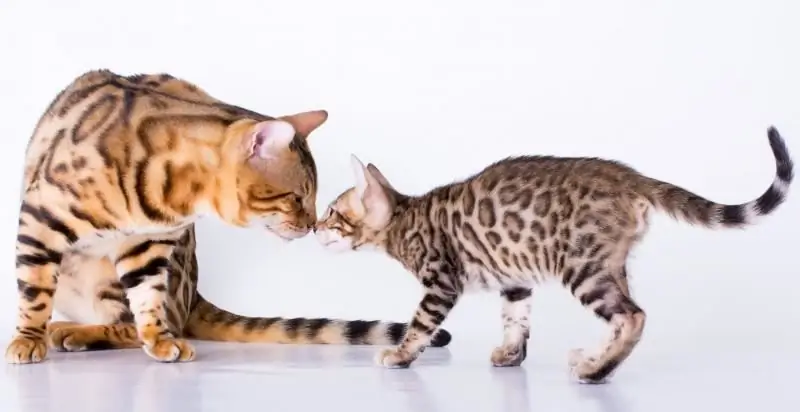
Domestic cats - class and family. Skeleton structure. Sense organs and their features. Endocrine, nervous and digestive systems of cats. Reproduction
Why Does A Cat Or Cat Shed Heavily And What To Do If The Hair Climbs And Falls Out In Large Quantities In A Kitten And An Adult Animal
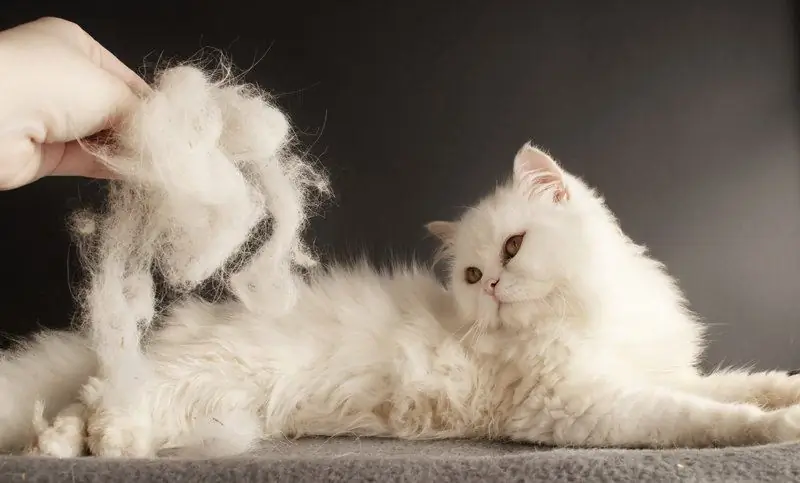
How is molting in cats normal? Features in different breeds. How to help a cat with normal and prolonged molting. Diseases manifested by abundant molting
Whiskers In Cats And Cats: What Are They Called Correctly And Why They Are Needed, What Will Happen If You Cut Them And Why They Fall Out Or Become Brittle
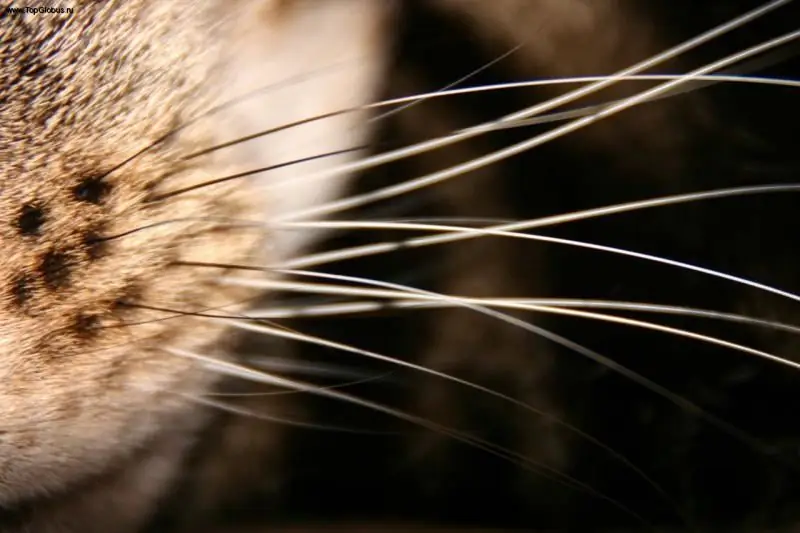
Features of the structure of the mustache in cats. What are they called and where they are located. What functions do they perform. What problems can a cat with a mustache have? Reviews
Why Does One Want To Cough From Dried Apricots: Causes Of Coughing After Eaten Fruits

Why does one want to cough from eaten dried apricots? Could this be a manifestation of an allergy? What to do to prevent sore throat from dried apricots
Why Does A Cat Or Cat Meow Constantly, The Reasons For This Behavior In Adult Animals And Kittens, What To Do If They Walk Around The House And Yell At Night
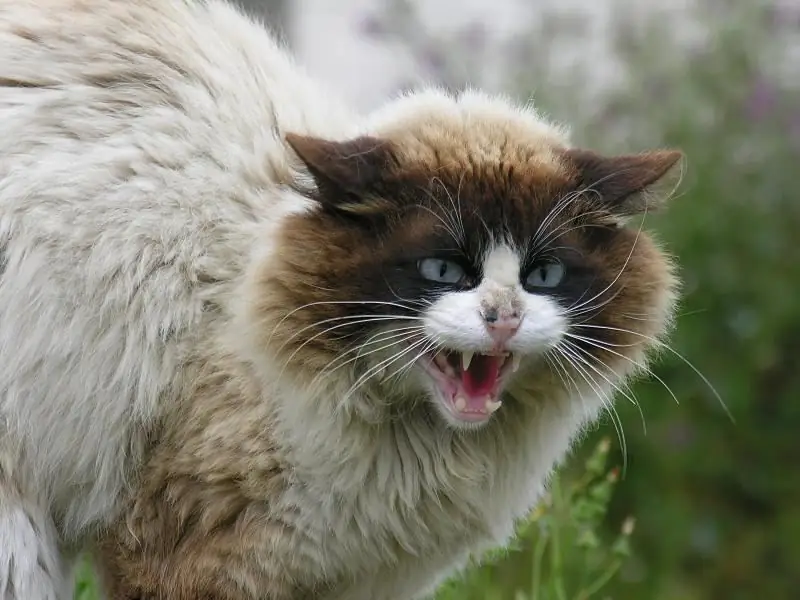
The reasons why a cat or kitten meows constantly. How to deal with it. When do you need to urgently see a doctor?
